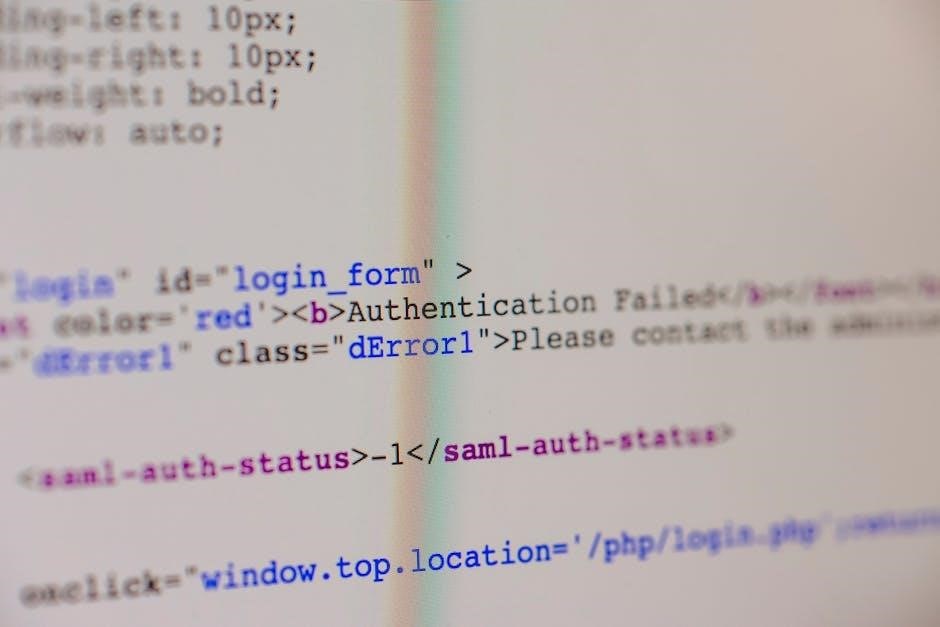Form 8621 is used by U.S. taxpayers to report interests in Passive Foreign Investment Companies (PFICs) and Qualified Electing Funds (QEFs), ensuring compliance with IRS regulations.
1.1 What is Form 8621?
Form 8621 is an IRS information return used by U.S. taxpayers to report interests in Passive Foreign Investment Companies (PFICs) and Qualified Electing Funds (QEFs). It ensures compliance with tax regulations on foreign investments, including income reporting and elections. Failure to file may result in penalties, even if no additional tax is owed, highlighting the importance of accurate and timely reporting.
1.2 Purpose of Filing Form 8621
The purpose of filing Form 8621 is to report income, gains, or distributions from PFICs and QEFs, ensuring compliance with U.S. tax laws. It is used to calculate tax liabilities, make elections, and provide detailed information about foreign investments. Accurate filing is essential to avoid penalties, interest, and ensure proper tax reporting for U.S. taxpayers with foreign investment holdings.

Who Needs to File Form 8621?
U.S. persons with interests in Passive Foreign Investment Companies (PFICs) or Qualified Electing Funds (QEFs) must file Form 8621, including direct or indirect ownership.
2.1 Eligibility Criteria for Filing
U.S. persons must file Form 8621 if they hold direct or indirect interests in PFICs or QEFs and receive certain distributions or meet specific ownership thresholds annually.
2.2 Direct and Indirect Ownership of PFICs
Direct ownership involves holding PFIC shares directly, while indirect ownership occurs through mutual funds, ETFs, or other entities. Both types trigger filing requirements, as the IRS monitors these investments closely to ensure compliance with tax regulations.

Understanding PFICs and QEFs
PFICs are foreign corporations generating passive income, such as mutual funds or ETFs. QEFs are PFICs allowing U.S. shareholders to elect tax treatment, potentially reducing tax burdens.
3.1 Definition of Passive Foreign Investment Companies (PFICs)
A PFIC is a foreign corporation where at least 75% of income is passive, such as dividends, interest, or rents, or 50% of assets produce passive income. This classification applies to foreign mutual funds, ETFs, and certain corporations, requiring U.S. shareholders to file Form 8621 to report holdings and comply with tax regulations.
3.2 What are Qualified Electing Funds (QEFs)?
Qualified Electing Funds (QEFs) are PFICs that meet specific IRS requirements, allowing shareholders to elect to treat them as QEFs. By filing Form 8621, shareholders can avoid certain penalties and report income annually, ensuring compliance with U.S. tax laws and regulations governing foreign investments.
Filing Requirements and Deadlines
Form 8621 must be filed annually with your U.S. tax return, adhering to the standard tax filing deadline. Extensions may apply if Form 4868 is submitted.
4.1 When to File Form 8621
Form 8621 must be filed annually if you hold interests in PFICs or QEFs. File it with your U.S. tax return (e.g., Form 1040) by the standard tax filing deadline. Extensions require submitting Form 4868, but this only extends the filing deadline, not the payment of taxes due. Timely filing avoids penalties and interest accrual, ensuring compliance with IRS regulations.
4.2 Deadline for Submitting the Form
Form 8621 must be submitted by the same deadline as your annual U.S. tax return, typically April 15th. If you file for an extension using Form 4868, the deadline extends to October 15th. Missing this deadline may result in penalties and interest. Ensure timely submission to avoid compliance issues with the IRS.

Completing Form 8621
This section provides a step-by-step guide to filling out Form 8621, ensuring accuracy and compliance with IRS requirements, including documentation and information needed for submission.
5.1 Step-by-Step Guide to Filling Out the Form
Start by identifying the PFIC or QEF and entering shareholder details. Calculate income, gains, and distributions, ensuring accuracy. Make elections if applicable, such as QEF or purification. Attach required statements and documentation. Review all entries for completeness and compliance before submission to avoid errors or delays.
Remember: Seek professional advice if unsure about any step to ensure proper filing and compliance with IRS regulations.
5.2 Required Documentation and Information
To complete Form 8621 accurately, gather essential documents, including statements of income, distributions, and gains from PFICs or QEFs. Provide detailed shareholder information, such as ownership percentages and acquisition dates. Include records of any elections made, like QEF or purification elections. Attach supporting schedules and calculations for taxable amounts. Ensure all data aligns with IRS requirements to avoid penalties or delays.
- Include proof of foreign ownership and distribution details.
- Verify calculations for interest and penalty assessments if applicable.

Calculating Tax Liabilities
Calculate tax liabilities using the highest applicable U.S. tax rate for the shareholder’s tax years, including interest charges on deferred income from PFICs and QEFs.
6.1 Methods for Calculating Tax on PFIC Income
The tax on PFIC income is calculated using the highest applicable U.S. tax rate for the shareholder’s tax years. Interest charges are applied to deferred income, significantly increasing the tax liability. The IRS also considers currency exchange rates for conversions, ensuring accurate calculations. This method ensures compliance with IRS regulations and proper reporting of foreign investment income.
6.2 Understanding Interest and Penalty Calculations
Interest and penalties are applied for non-compliance with PFIC reporting. The IRS calculates interest on deferred income, increasing tax liability. Penalties for late or inaccurate filing can also apply. Consulting a tax professional ensures accurate calculations and avoids unnecessary charges, helping taxpayers navigate complex PFIC regulations effectively.

Special Considerations
Special considerations include late elections via Form 8621-A and the impact of currency exchange rates on PFIC income reporting, requiring careful handling to avoid compliance issues.
7.1 Late Elections and Form 8621-A
Form 8621-A is used for late elections to end PFIC treatment. Taxpayers must attach it to Form 8621, providing detailed explanations for late filings. The IRS reviews these cases carefully, and penalties may apply. Proper documentation is essential to avoid additional scrutiny or delays in processing the election.
7.2 Impact of Currency Exchange Rates
Currency exchange rates significantly affect Form 8621 filings, as all foreign amounts must be converted to U.S. dollars using official IRS rates. Fluctuations can impact reported income, gains, and distributions, influencing tax liabilities. Accurate conversions are crucial to avoid discrepancies and ensure compliance with IRS requirements.

Recent IRS Updates and Changes
The IRS has consolidated burden evaluations for trust and estate filers, gaining OMB approval. Form OMB 1545-1002 will be discontinued, simplifying filing instructions for taxpayers.
8.1 IRS Consolidation of Burden Evaluations
The IRS has consolidated burden evaluations for trust and estate filers, streamlining the process and reducing administrative complexity. This change aims to enhance efficiency and clarity for taxpayers, ensuring compliance with updated regulatory standards while maintaining accurate reporting requirements for Form 8621 filers.
8.2 Discontinuation of OMB 1545-1002
The IRS has discontinued OMB 1545-1002 following the consolidation of burden evaluations for trust and estate filers. This change simplifies reporting requirements for Form 8621, reducing administrative burdens and aligning with updated regulatory standards. Taxpayers should refer to the latest IRS guidance for filing instructions and ensure compliance with the new procedures.
Tips for Accurate Filing
Consult tax professionals, follow updated IRS guidelines, double-check calculations, and meet deadlines to ensure accurate Form 8621 filing. Utilize e-filing options for efficiency.
9.1 Best Practices for Completing Form 8621
Consult a tax professional to ensure compliance with IRS rules. Use the latest instructions and double-check calculations. Maintain organized records of PFIC transactions. Submit Form 8621 timely to avoid penalties and interest. Utilize e-filing for accuracy and efficiency. Ensure all required documentation is attached and review for completeness before submission. Stay informed about IRS updates and guidance to avoid errors.
9.2 Avoiding Common Mistakes
Common mistakes include incorrect reporting of PFIC income, failing to file timely, and miscalculating tax liabilities. Ensure accurate completion of all sections, proper documentation, and adherence to IRS guidelines. Avoid missing deadlines, as penalties can accrue. Double-check calculations, especially regarding currency exchange rates, to prevent errors. Seek professional advice if unsure to ensure compliance and minimize risks of audits or penalties.

Importance of Professional Advice
Consulting a tax professional ensures accurate filing, minimizes errors, and helps navigate complex PFIC regulations, avoiding penalties and ensuring compliance with IRS requirements.
10.1 Consulting a Tax Professional
Consulting a tax professional is essential for navigating the complexities of Form 8621. They provide expert guidance on PFIC regulations, ensure accurate filing, and help avoid costly penalties. Their expertise in handling intricate tax scenarios ensures compliance with IRS requirements, offering tailored solutions for individual circumstances.
10.2 Role of Tax Attorneys and Advisors
Tax attorneys and advisors play a crucial role in navigating the complex legal aspects of Form 8621. They ensure compliance with IRS regulations, provide expertise in PFIC-related matters, and represent clients in audits or disputes. Their guidance helps minimize penalties and optimize tax outcomes, ensuring accurate and timely filing of the form.

State Tax Implications
Form 8621 filings may have state tax implications, as states often impose additional reporting requirements for PFIC-related income. Taxpayers should consult state-specific rules to ensure compliance with both federal and state regulations.
11.1 Impact of Form 8621 on State Taxes
While Form 8621 is a federal requirement, its impact extends to state taxes. States may impose additional filing requirements or apply different tax rates to PFIC income. Some states follow federal PFIC rules, while others have distinct regulations. Taxpayers must review state-specific guidelines to ensure compliance, as failure to report properly can result in penalties at both federal and state levels.
11.2 Reporting Requirements for State Authorities
State tax authorities may require additional reporting for PFIC-related income. Taxpayers must check if their state of residence requires specific forms or follows federal PFIC guidelines. Some states classify PFIC income differently, potentially leading to varying tax obligations. Non-compliance at the state level can result in penalties, emphasizing the need to review and adhere to state-specific reporting requirements carefully.

Consequences of Non-Compliance
Failing to file Form 8621 can result in penalties, interest charges, and potentially higher taxes, emphasizing the importance of timely and accurate compliance with IRS requirements.
12.1 Penalties for Late or Inaccurate Filing
Failing to file Form 8621 or providing inaccurate information can result in penalties, interest charges, and higher taxes. The IRS applies the highest tax rate applicable to the shareholder over those years and may impose interest charges. This can lead to a significantly higher tax bill compared to other types of investment income, emphasizing the importance of timely and accurate compliance with IRS requirements.
12.2 Strategies to Avoid Non-Compliance Issues
To avoid non-compliance, consult a tax professional for guidance on PFIC rules and Form 8621 requirements. Ensure accurate record-keeping of foreign investments and timely filing of the form with your annual tax return. Stay informed about IRS updates, such as changes to OMB numbers or filing deadlines, to maintain compliance and avoid penalties.
